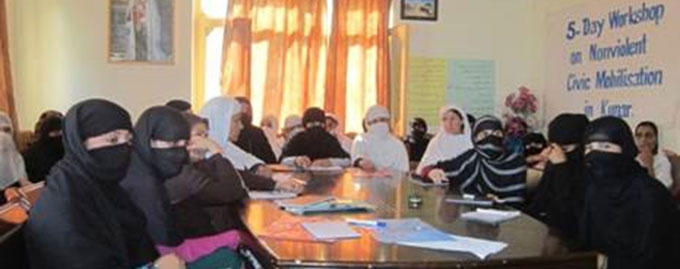Corruption, coupled with a weak legal system, is a rampant problem in Afghanistan. Afghanistan currently ranks 175th in corruption globally, ahead of only Somalia and North Korea1, and fragile local governments and widespread fraud and bribery are prime causal factors of the ongoing insurgency in Afghanistan. The pervasive nature of bad governance and the lack of rule of law have fueled anti-state feelings among Afghan citizens, a sentiment often being exploited by the Taliban and other insurgent groups.

In July 2013, USIP awarded OSCAR (Organization for Social and Cultural Awareness and Rehabilitation), an Afghan NGO a small grant to educate and train local civil society groups in Kunar Province to oppose corruption. OSCAR empowered civil society groups to work with targeted communities to learn about non-violent means of community mobilization and develop broader knowledge regarding the role and effect of good governance. OSCAR conducted trainings for 161 members of civil society that included religious scholars, members of District Development Shuras, tribal chiefs, journalists and youth activists - including 64 women.
For the training sessions, OSCAR translated and utilized the Pashto version of the book Civilian Jihad: Nonviolent Struggle, Democratization, and Governance in the Middle East, written by USIP Senior Policy Fellow Maria J. Stephan, which chronicles the history of significant nonviolent civilian-led campaigns and examines the role of strategy, political humor, religion, Islamist movements and external actors in advocating for improved governance.
"Ahmadullah Archiwal and OSCAR have done a tremendous job adapting knowledge and know-how about strategic nonviolent action to support their work in Afghanistan," says Stephan. "They have used examples of effective civic mobilization from their own history - along with lessons of nonviolent campaigns and movements from around the world - as part of their workshops and trainings. They are building consciousness and capacity in some of the most violence-affected parts of Afghanistan on how to advance justice and good governance using active nonviolent means. This is a huge contribution to the rebuilding of Afghanistan."
Following the trainings, OSCAR established a committee of 34 volunteers who are launching positive civil activities and raising issues of corruption and transparency in the community. This increased awareness has already resulted in Radio Badloon, a local radio station, airing roundtables investigating alleged corruption involving road repair in the provincial capital, Asadabad. A local print magazine, Kunar Ghag, has also begun publishing articles related to corruption and government transparency.
OSCAR's efforts have also impacted local youth who are communicating the messages of the workshops and networking through increased participation in their District Youth Shuras. Additionally, many of the youth served as elections observers in the landmark 2014 presidential elections and will serve again during the June 14 run-off. As such, USIP and OSCAR are preparing youth to become community leaders promoting citizen-led efforts to support good governance as a vital component of a peaceful Afghanistan.



